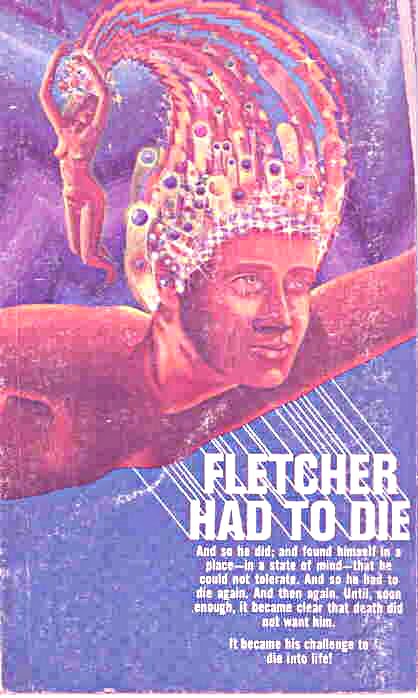Transmigration (27 page)
Authors: J. T. McIntosh

enough to admit it to himself and to Rodney. The human brain was still
comparatively unmapped territory. Rodney had never been operated on
and there had been no real psychiatric treatment. It had been thought
that he could not possibly respond to it, being capable of only a few
meaningful sounds that meant he was hungry or thirsty. or wanted to go
to the bathroom.
brain that was not normal suddenly going right.
Paradise. Indeed, the doctor was clearly reluctant to let him sleep even
that night in his old cell.
about what might be coming, being too concerned over setting the past
and the present to rights to have time to consider the future.
in Cumberland . . . "
confidence than he probably felt, Dr. Brooke had said he was quite
capable of traveling by himself. It was one of the trusting gestures
made by psychiatrists which didn't always come off.
children in swimsuits ran past him, the girls chasing the boys. He looked
at them with pleasure.
a name. There was no coincidence in his life.
it, but it didn't matter. He needed no proof.
all tragedy. Rebelling against her humdrum life with Baudaker, she had
an affair with another man, a worthless man, a subnormal man. And she
didn't know what to do when she found herself pregnant.
senseless, motiveless, so shamefully wrong. Besides, the baby would not
be normal. She knew that from the start.
public care and went home to see Baudaker once more. Perhaps if he had
been cruel it would have been kind. Instead, he was overpoweringly glad
to see her back.
never tell Baudaker about it. It would not add to his happiness. But it
fitted into Fletcher's cycle so neatly it had to be true.
with small shops on both sides, cars parked on cobbles off the main
road, pretty young mothers pushing prams and leaving them outside shops,
children everywhere, running, shouting. Several people smiled at him
and he smiled back.
could be considered dirty, untidy, unattractive and unwelcoming if people
were predisposed to see it like that. Or it could be. as Rodney saw it, an
ideal place to grow up and find oneself, if such a thing were necessary.
but not unfriendly. At least the iron gates were wide open.
but he did not. He wandered round the old building and found that at the
rear the gardens were lovely. Several children passed him, staring at him
curiously. They were, sadly, quite unlike the shrieking brown children
in the town. They were too clean, too solitary, too cautious. Several
of them had calipers on their legs, and some had wasted limbs. But most
of them smiled back at him.
indicated that the children who could take pleasure in gregarious play
were doing so. For the most part, he saw those who could not.
to be freedom in a place like this, or it was valueless. Life, too,
offered freedom. You took it or you put yourself in chains.
cruelty and intolerance and boredom and frustration. But these were the
obstacles in the obstacle-filled race of life. Anyone lucky enough to get
a second chance in life ought to be able to make light of circumstances
twenty times worse than he was likely to encounter here.
haven.
almost at the moment of death and, possibly, revelation would have
to be considered sometime. But they were not the sort of things a
thirteen-year-old boy had to bother his head about for a long time. His
very age, independent of anything else, gave him at least half a dozen
years' grace before he could take any positive place in the world..
girl. She wore the navy pants of a child and the casually tied suntop
of a pretty and well-shaped woman. She was brown and was the loveliest
thing he could recall seeing in his life.
know me?"
names, and just for convenience I said Fletcher,"
world, isn't it?"
possibly call me Mr. Fletcher."
the most beautiful girl in the world. He was in no doubt about that,
though he remembered Gerry had thought much the same about Daphne and
Ross about Anita. He had nothing against Anita or Daphne, but anyone
who preferred them to Judy needed his head examined.
Mr. Fletcher."
he said.
lost his balance and clutched her. Her warm brown flesh felt even more
wonderful than it looked. Thirteen he thought with momentary gloom. Why
couldn't he and Judy have been five years older?
Judy. "What on earth's that?" he said.
 FLETCHER HAD TO DIE
FLETCHER HAD TO DIEAnd so he did; and found himself in a
place -- in a state of mind -- that he
could not tolerate. And so he had to
die again. And then again. Until, soon
enough, it became clear that death did
not want him.
It became his challenge to
die into life.
Other books
40 Something - Safety by Shannon Peel
Cowboys & Angels by Vicki Lewis Thompson
Make or Break the Hero (The Hunter Legacy Book 4) by Timothy Ellis
Precious Stones by Darrien Lee
Journey to Bliss (Saskatchewan Saga Book #3) by Ruth Glover
Death of a Teacher by Lis Howell
Hunters (Spirit Blade Part 1) by M. A. Nilles
Curves for the Werewolf (Paranormal BBW Erotic Romance, Alpha Wolf Mate) by Cassie Laurent
Multiplayer by John C. Brewer
Carnage on the Committee by Ruth Dudley Edwards
